Many of you know I am an unofficial spokesperson for sardines : ) This post will tell you all about sardines, including what nutrients they contain, sardine brands I like, and how to prepare these fish in a tin!
Fish In A Tin
Canned fish is a convenient and long-lasting source of protein that can be used in a variety of dishes, including salads, sandwiches, pasta, and more. It’s a popular choice for people who want a quick and easy way to incorporate fish into their meals, and it has a relatively long shelf life, making it a practical option for stocking your pantry. Canned fish is an ingredient with culinary versatility that can help you create quick meals.
Some common types of fish that you can find in tins or cans include:
- Tuna: Canned tuna is widely available and can be used in sandwiches, salads, casseroles, and sushi.
- Sardines: Canned sardines are often packed in oil or tomato sauce and can be served on crackers, in pasta dishes, or as a topping for salads.
- Salmon: Canned salmon is used in various recipes, including salmon patties, salads, and spreads.
- Anchovies: Canned anchovies are known for their strong, savory flavor and are often used as a pizza topping or in pasta sauces.
- Mackerel: Canned mackerel is another option for those looking to add variety to their canned fish choices.
I love canned tuna and smoked salmon, but my favorite fish in a tin is sardines, so I’m going to focus on sardines in this post.
Are sardines so good for you?
I truly believe sardines are one of the world’s healthiest foods because they contain three of the essential nutrients Americans are often deficient in: omega-3 fatty acids, calcium, and vitamin D.
Here are some of the benefits of sardines:
- Rich in Omega-3 Fatty Acids: Sardines are an excellent source of omega-3 fatty acids, particularly eicosapentaenoic acid (EPA) and docosahexaenoic acid (DHA). These fatty acids are known for their cardiovascular benefits, including reducing inflammation, improving blood vessel function, and lowering the risk of heart disease.
- High in Protein: Sardines are a good source of high-quality protein, and when you are consuming sardines in a can, you don’t even need to do any cooking!
- Loaded with Nutrients: Sardines are rich in vitamins and minerals, including vitamin B12, vitamin D, calcium, and selenium. Vitamin B12 is crucial for nerve function and the production of red blood cells, while vitamin D helps with bone health and immune function. Calcium is essential for strong bones and teeth, and selenium acts as an antioxidant, protecting cells from damage.
- Bone Health: Sardines are also one of the best sources of calcium and vitamin D, which are essential for maintaining strong bones and may help prevent osteoporosis.
- Anti-Inflammatory Properties: The omega-3 fatty acids in sardines have anti-inflammatory properties. Reducing inflammation may help reduce the risk of chronic diseases, such as arthritis.
When incorporating sardines into your diet, it’s essential to consider the form in which you consume them. Fresh or canned sardines in water or olive oil are healthier options compared to those with sugars or high-sodium content added in the canning process.
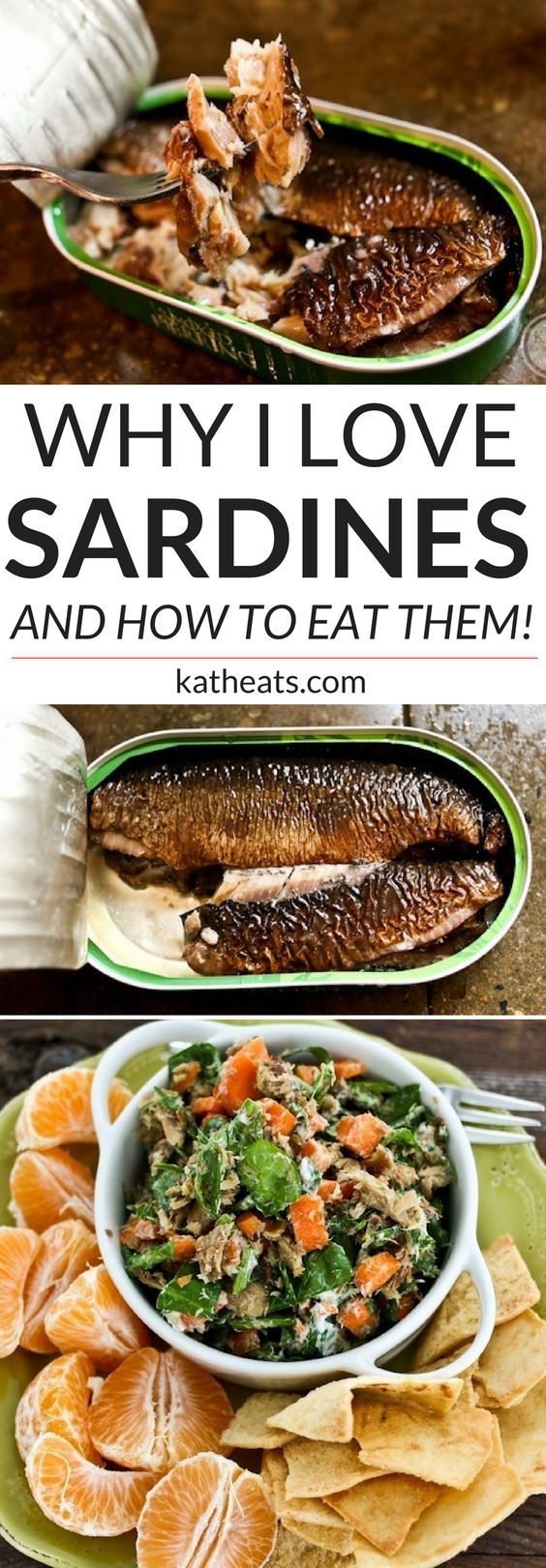
Sardines are great staple food because they are:
Inexpensive
$1 a tin for sardines packed in water, $4 or so for fancier kinds
Shelf stable
keep them in your pantry at all times for a quick meal
Already cooked
Ready to eat, no prep or dishes to wash.
Nutritious!
Full of high quality protein and good fats
Sustainable
A sustainable fish low in mercury. USA sardines are a best choice for Seafood Watch. Sardines are small fish that are lower in the food chain, which means they tend to accumulate fewer contaminants like mercury compared to larger fish. This makes sardines a safer seafood option, especially for women in childbearing years and young children. (My 11 year old loves sardines!)
Versatile
Mash them on crackers, make a salad, turn them into a sandwich spread, cook into sauces.
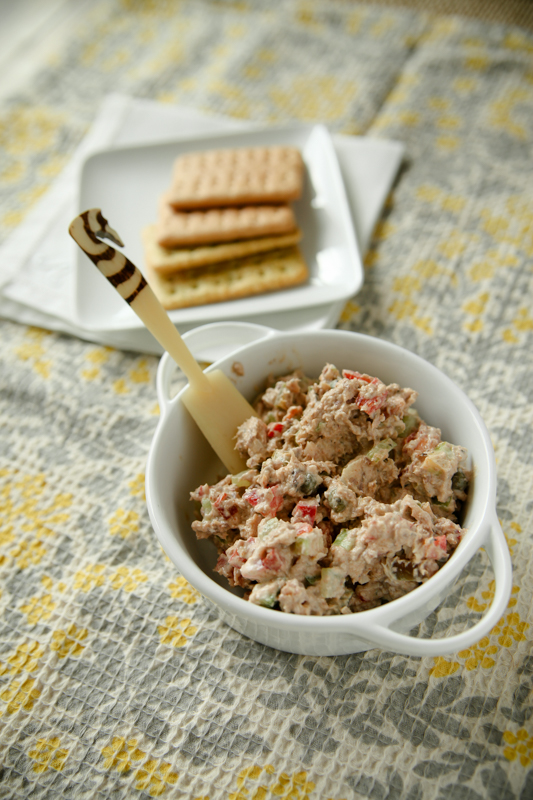
How did I learn to eat sardines?
I was on a tuna/salmon salad kick, so learning to like sardines was an easy crossover.
I actually first tried sardines when I was in high school from a tin my dad had in our pantry.
See more : The Complete Guide To Modelo Alcohol Percentage & Most Popular One!
At the time I thought they were OK, but not knowing they were so healthy or creative ways to make a sardine salad, I didn’t really make them a regular staple in my diet.
I believe this was my first time trying them!
I first started eating sardines years ago when I kept reading about them in health magazines as an under appreciated superfood. “If they are that nutritious I should be eating them!” I thought.
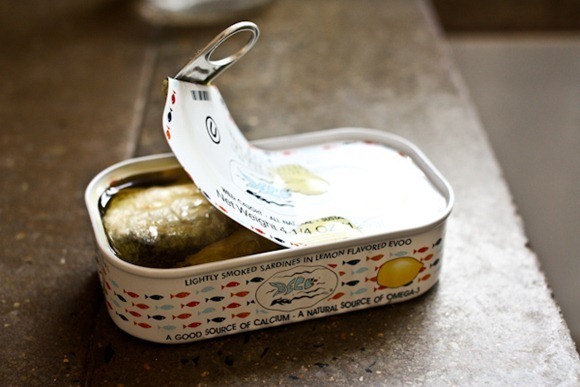
How to eat sardines:
I’ve seen grilled sardines on a menu in a restaurant before. I don’t know that I’ve seen fresh sardines at the grocery store, but I’m sure they are in some! Most often you’ll find them in a tin in the middle of the grocery store with the other tinned seafood.
I tell people: if you like tuna salad and you like fish, you’ll like sardines. If you aren’t so hot on fish, however, you probably won’t like them.
I prefer mine smoked (extra flavor) and I don’t eat them from the tin directly (although you certainly could). I tend to mash them up into salads, spreads and things.
Sardines are a member of the herring family so I often use sardines and herring interchangeably. Herring are a little bigger, but I can’t really tell much of a difference between them in taste.
When using canned fish, you can drain the liquid (e.g., water, extra virgin oil, or sauce) from the can before incorporating it into your recipes, which will help reduce the sodium if you’re watching your sodium intake for any reason.
Perhaps I need to do a side-by-side taste test…
Here are what they look like when you open the tin and drain them:
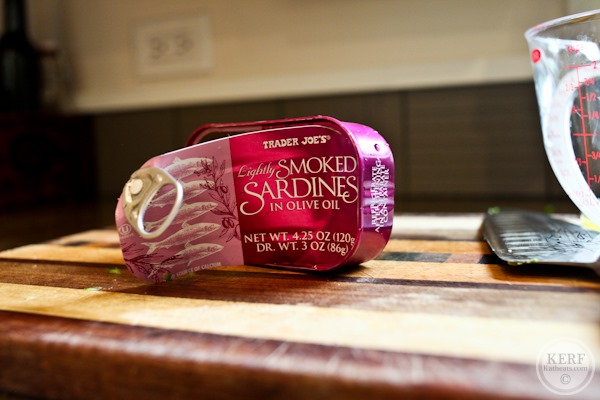
Do sardines have bones?
You can easily flake the fish to look like chunk light tuna. I think what scares people so much about “fish in a tin” is the thought of bones. But the bones are so soft and mashable – they are not like the fish bones you fear.
Sardine bones are soft
People think of bones as pointy, stiff and dangerous to eat. Sardine bones are soft and you mash them with the filets. They are where all the nutrients are!
You can’t even really see them:
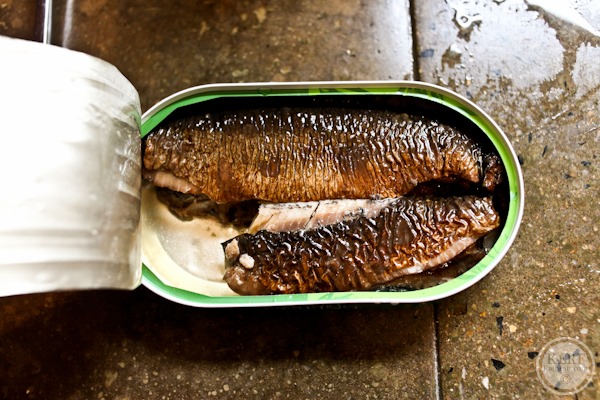
How to eat sardines video!
Don’t be scared – just watch this video for a live demo of how to make a sardine salad:
My favorite sardine brands
As I mentioned before, sardines range in price from $1 (or less!) a tin up to $4-5 for fancier tinned fish brands.
See more : What is the sharpest blade on the planet?
The brand I’ve gotten most in the past is Trader Joe’s because I love the smoky flavor.
Sardines are actually at risk for overfishing.
The fish themselves are safe to eat (aka low in mercury), but the concern is the way they are caught, which leads to overfishing and putting the population at risk, so you have an environmental decision to make.
In fact, according to Seafood Watch, the U.S. Pacific sardine fishery is closed because the population numbers are too low.
Look for brands that are endorsed by the Marine Stewardship Council, Seafood Watch, or sustainably caught.
Wild Planet is always an easy choice for seafood, as all of their products are sustainably caught.
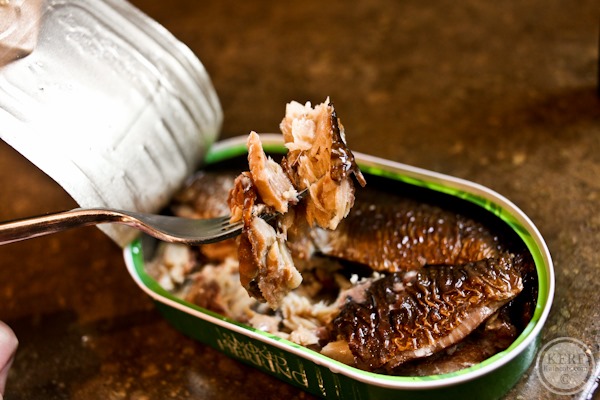
Sweet + Smoked
The brand Bar Harbor from Maine is also great! I love the sweet – savory combo of smoked + maple syrup. The maple flavor is subtle (think slightly sweet & smoky bbq sauce) and the fish is flakier and less fishy than other brands I’ve tried.
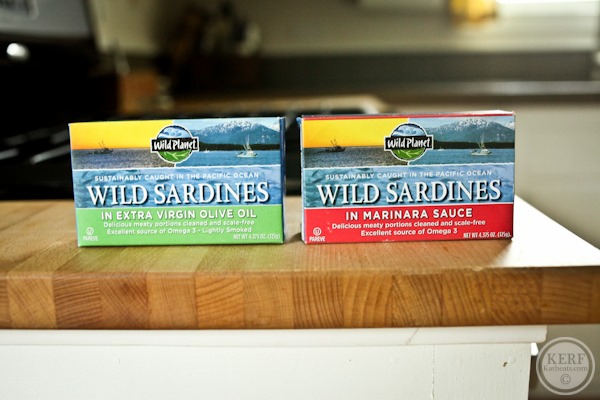
Sardine Recipes
I like to chop in all kinds of veggies – carrots, celery, peppers – plus add some binders in the form of mustard, mayo, Greek yogurt and then spice things up with salt, pepper, curry powder, smoked paprika, dill, lemon juice, capers and more.
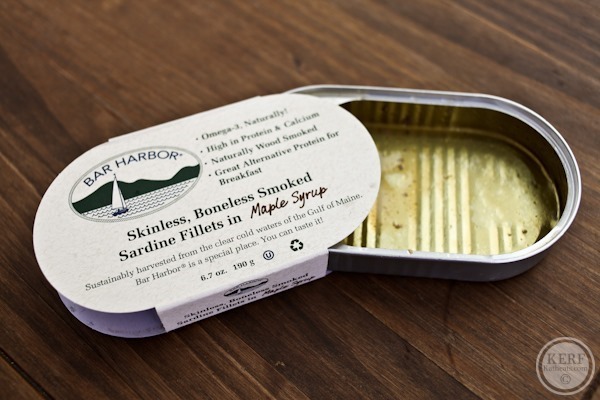
How to make sardine salad:
Step 1: Drain and mash
Drain your sardines and mash them with a fork until you reach a uniform consistency.
Step 2: Add veggies
Add a quarter cup to half cup of chopped veggies
Step 3: Add binders
Mix in 1-2 teaspoons Dijon mustard and add 1 tablespoon mayo or Greek yogurt
Step 4: Add seasonings
Sprinkle 1-2 teaspoons of seasonings to taste
Step 5: Serve
Serve over greens, with chips, on a sandwich, with crackers, or simply eat with a fork.
Check these two posts for step-by-step how-tos!
- Simple Sardine Salad
- The Very Best Sardine Salad
Here is a massive list of just some of the ways I’ve enjoyed sardines and herring over the years:

Sardine Meals
- Long Time, No Sardine
- Sardine Cocktail
- Sardine Salad on Salad
- Smoked Herring Salad
- Scoopable Salad
- Sardine Sandwich
- Sardine Toast
- Fancy Feast
- Sandwich II
- Open-Faced Pesto Sandwich
- Mixed Veggies
- Red Curry Broiled on Eggplant
- Chopped Sardines
- With Pumpkin Seeds
- Layered with Avocado
Nigel Gildon editor:Nigel Gildon is the editor of Chef Wayne’s Big Mamou: Chef Wayne’s Big Mamou. He has worked in the publishing industry for many years and has a passion for helping new authors get their work into the hands of readers. 63 Liberty Street * Springfield, MA 01003






